Civilians paying the price for Beirut attack
Lebanese and Syrians near site of Iran cultural centre bombings say they have borne the brunt of recent attacks.

Beirut, Lebanon – The twin suicide bombing that hit the southern suburbs of Beirut during the morning rush hour on Wednesday has killed five people and wounded more than 100.
Glass covered the road and the facades of nearby buildings were torn off. Emergency teams carried wounded people away from a charred street strewn with rubble.
The blasts were caused by two suicide bombers of the Abdullah Azzam Brigades, an al-Qaeda-linked group that claimed responsibility via Twitter for Wednesday’s attacks, which targeted the Iranian cultural centre.
A wave of bombings linked to the war in neighbouring Syria has struck Lebanon during the past few months, killing and wounding scores of people. Many have hit Shia areas of the capital under the control of Hezbollah.
Syrian rebels have vowed to strike against Hezbollah in Lebanon in retaliation for its participation in the war on behalf of the Assad regime.
Residents and passersby said that civilians are paying the price for the attacks hitting Beirut.
| Ali Hazimah, 23, chandelier shop owner |
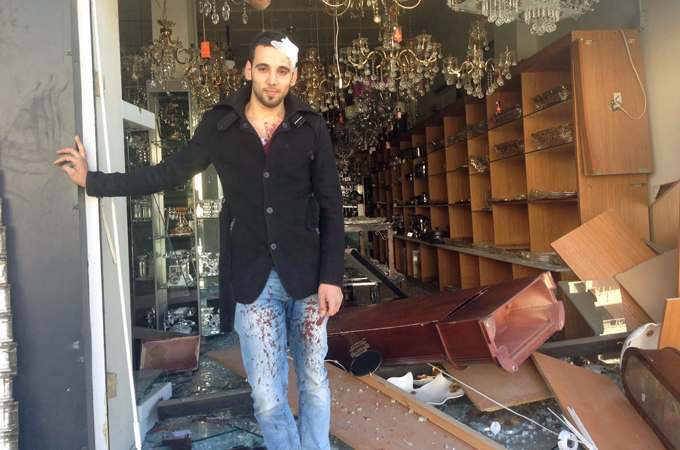 |
| Ali Hazimah [Basma Atassi/Al Jazeera] |
Ali owns a chandelier shop just few metres from where one of the blasts took place. Shattering glass from the collapsing chandeliers caused him a mild head injury.
“We will stay strong,” he said, smiling, with blood covering his face and clothes.
His shop had been damaged before, during the November 19 attack on the Iranian embassy, but the destruction to his shop was not as severe.
“We have been affected economically, not only by the damage, but also by the fact that less people are coming to this neighbourhood,” he said. “But we will not be shaken. We will stay strong.”
| Ali Mokdad, 50, member of parliament |
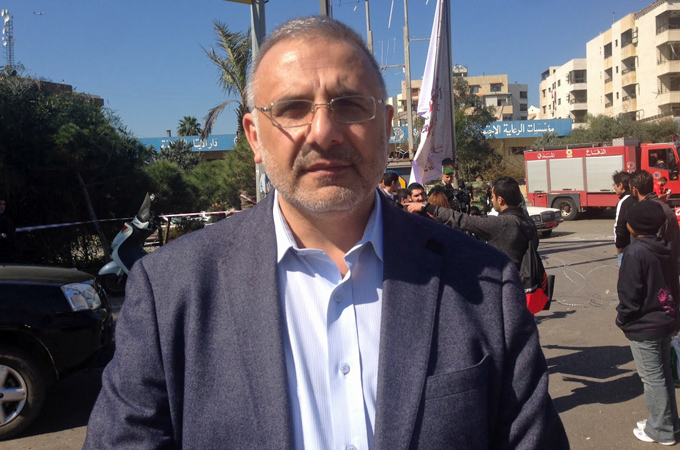 |
| Ali Mokdad [Basma Atassi/Al Jazeera] |
Ali Mokdad, an MP representing Hezbollah in Lebanon’s parliament, blamed “terrorists and takfiris [Muslims who accuse other Muslims of apostasy]” for for the attack.
“Those who are bombing in Lebanon are the same people who bombed in Afghanistan, Iraq, Syria, Algeria,” he told Al Jazeera at the site of the blasts.
When asked whether the attack was retaliation for Hezbollah’s participation in the Syrian war, he said: “Had Hezbollah not been in Syria, there would have been hundreds of bombings in Lebanon.” He said the Shia armed group was repelling “terrorists” in Syria from entering Lebanon. Mokdad called on the new Lebanese government to pass a decree denouncing terrorism and urged Lebanese politicians to unite in the fight against terrorists.
| Hussain, 64, taxi driver |
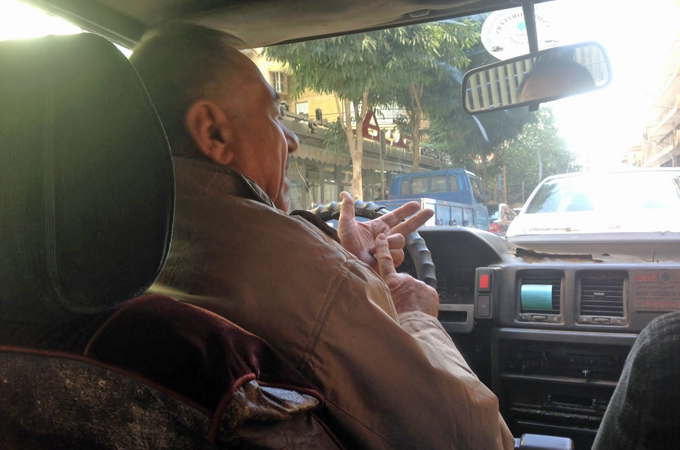 |
| Hussain [Basma Atassi/Al Jazeera] |
Hussain was driving his car near the Beir Hassan neighbourhood when the blasts struck the area. “All those who died were civilians for no reason. It is a big political game by politicians, but only civilians are affected.”
He is a Shia from the southern suburbs of Beirut, a Hezbollah stronghold, but he does not support the Shia armed group’s involvement in Syria. “I am Lebanese, and we should concentrate on Lebanon. I do not understand why we should have to go to Syria or elsewhere. At the end of the day, only civilians are paying the price.”
He does not want his face to be visible in the photo because he said he fears he could be harassed for his opinion and accused of being a “collaborator”.
| Om Ali, 57, housewife |
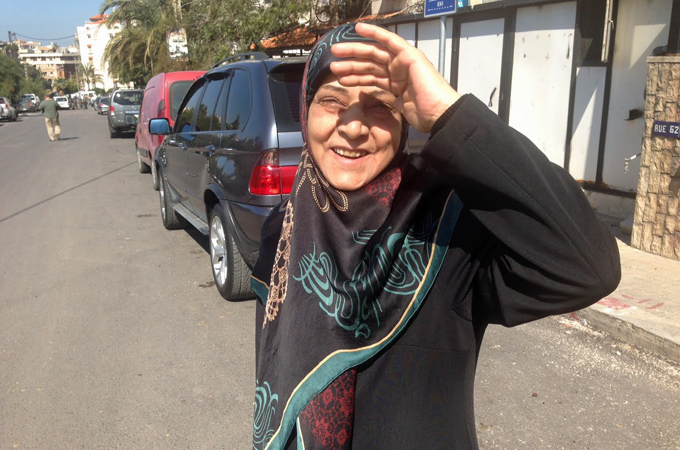 |
| Om Ali [Basma Atassi/Al Jazeera] |
Om Ali rushed to the explosion site to check on her husband, who works in a restaurant located right between the two blasts that hit the area.
The military did not allow her to enter the barricaded area to meet her husband, but she managed to speak with him over the phone and made sure he was fine.
“They shouldn’t be bombing here in civilian areas. If they want to take revenge from Hezbollah, they should go fight Hezbollah,” she said. She blames the attack on “takfiris who want to sabotage the resistance project of Hezbollah.”
| Samir Batheesh, 52, Syrian worker |
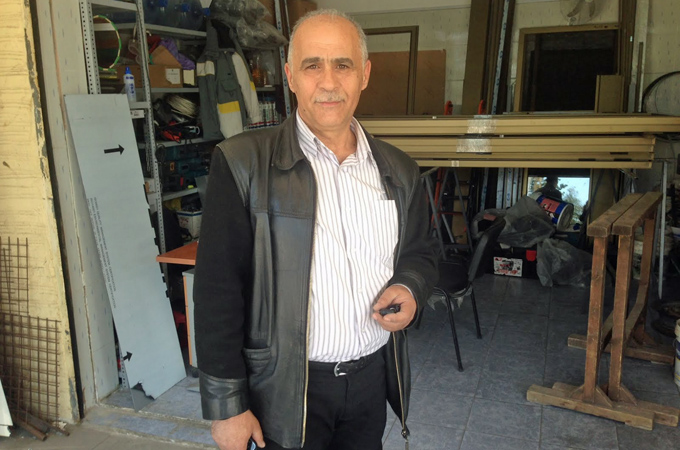 |
| Samir Batheesh [Basma Atassi/Al Jazeera] |
Samir used to be the owner of an aluminum company in Damascus. But the war in Syria forced him to flee to Lebanon and work in an aluminum shop located metres from where the attack took place. “Glass fell over our heads. We were too overwhelmed to understand what really happened,” he said.
He hoped that Syrians were not involved in the attack because he fears reprisal against him and his family by angry Lebanese.
“We are peaceful, and we have come here to work. We do not want to hear insulting words for deeds that we did not commit.”
| Syrian refugee family from Aleppo |
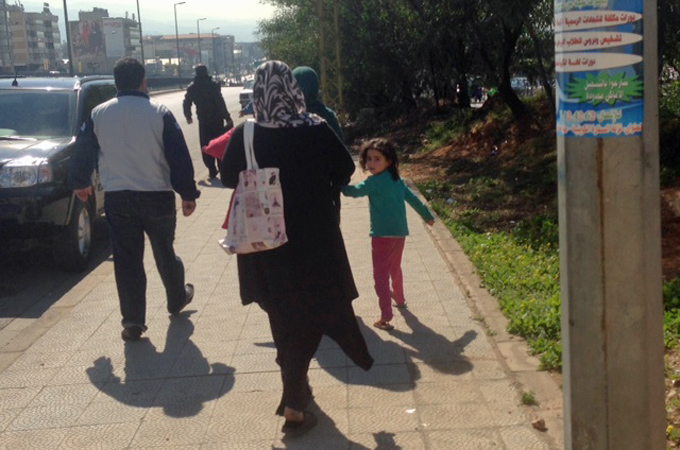 |
| Syrian refugee family from Aleppo [Basma Atassi/Al Jazeera] |
On a bridge in Beir Hassan, near the site of the attack, a Syrian family loudly prayed that “God punish those criminals” who carried out the attack.
“Those who committed the attack are irrational. They are not Muslims. Muslims do not kill other Muslims,” said one of the women, who did not want her identity to be revealed, citing security concerns.
The family fled the Syrian city of Aleppo six months ago after their house was destroyed in the fierce clashes there.
The woman pointed to a building damaged by the attack and said: “Do you see this building? It reminds me of how my destroyed city looks like. We have suffered from violence and we know how it feels. We do not want other people to endure the same pain.”
Follow Basma Atassi on Twitter: @Basma_